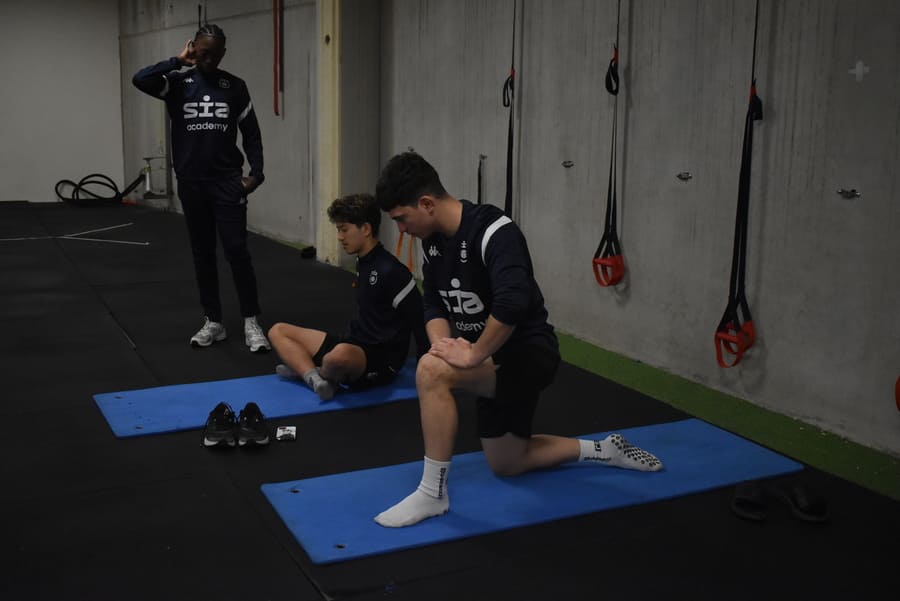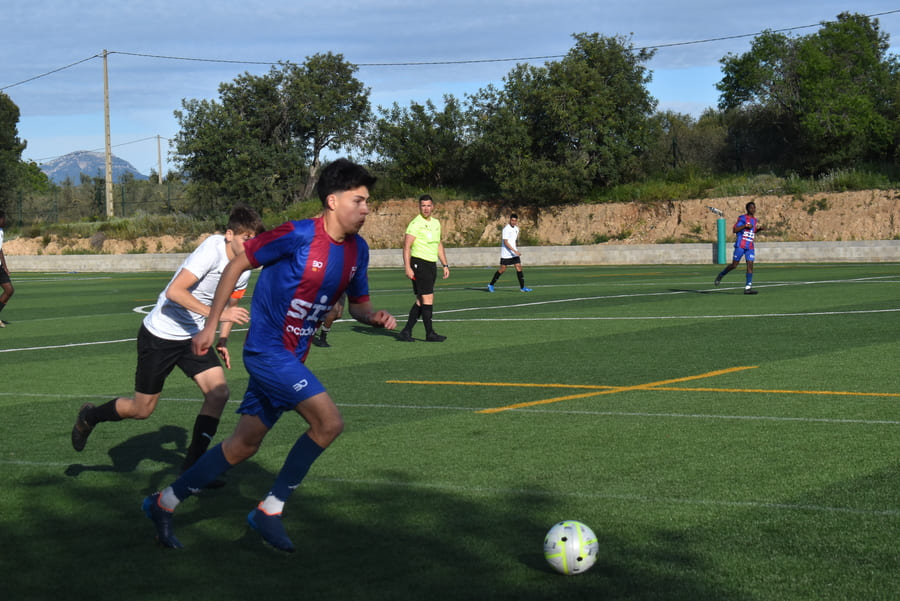In modern football, nutrition has become as important a tool as training itself. The difference between performing at your best or running out of energy in the final minutes can largely depend on the proper management of carbohydrates. These often-misunderstood nutrients are the main fuel the body uses to sustain prolonged physical effort. In this article, I’ll explain the importance of carbohydrates in a footballer’s diet and how we work on this aspect at SIA Academy, where we understand that without good nutrition, there is no good performance.
Table of contents
What carbohydrates are and why they’re essential
Carbohydrates, also known as carbs, are the body’s most efficient source of energy. During a football match, a player can cover between 9 and 12 kilometers, alternating runs, sprints, turns, and accelerations. All these actions require quick and sustained energy, which mainly comes from muscle glycogen — the body’s way of storing carbohydrates.
Cristóbal, our nutritionist, sums it up perfectly:
“Carbohydrates are the footballer’s fuel. Without them, the body can’t maintain the intensity the game demands.”
When glycogen stores are depleted, fatigue appears, technical precision decreases, and decision-making slows down. That’s why proper carbohydrate intake before, during, and after training or matches is essential to maintain performance and promote recovery.

How footballers should consume them
Carbohydrate intake shouldn’t be random. It must be adjusted to the workload of each day and the phase of the season. In our approach at SIA Academy, we teach players to periodize their nutrition just as they do their training.
On high-intensity days, such as double sessions or match days, we recommend an intake of between 6 and 10 grams of carbohydrates per kilogram of body weight. On lighter or recovery days, that amount can be reduced to avoid unnecessary excess energy.
The key consumption moments are three:
- Before training or matches: carbohydrates should be consumed 2 to 3 hours beforehand, preferably from complex sources such as oats, brown rice, or pasta. This ensures a steady energy release.
- During the match: in sessions or games lasting over 60 minutes, replenishing with isotonic drinks or gels is essential to maintain blood glucose levels.
- After exertion: within the first hour afterward, the body is especially receptive to replenishing glycogen. Mixing carbohydrates with protein helps accelerate muscle recovery.
Types of carbohydrates: quality before quantity
Not all carbohydrates are the same. In our nutritional methodology, we distinguish between simple and complex carbs. Complex carbohydrates — such as whole grains, potatoes, quinoa, or legumes — are absorbed slowly and keep energy levels stable. Simple carbohydrates, like sugar or sweets, provide quick energy but should be reserved for specific moments, such as immediate post-match recovery.
Cristóbal emphasizes that the key lies in quality:
“It’s not just about eating pasta or rice. What matters is when and how you eat them. Good timing makes the difference in performance.”
At SIA Academy, we teach our footballers to identify the right sources depending on the time of day and the type of effort they’ll be performing. Nutritional education is an essential part of our training process, because we want players to be autonomous and understand how their body works.
Cognitive performance
Football demands not only physical energy but also mental focus. Quick decision-making, concentration, and technical precision depend partly on a constant supply of glucose to the brain. When glucose levels drop, more mistakes occur, coordination decreases, and reaction time slows down.
That’s why we insist that players shouldn’t train on an empty stomach or follow low-carb diets. A well-fueled brain processes information better and allows players to maintain tactical intensity throughout the match.
Recovery: the other half of performance
After every session or match, another key phase begins: recovery. Here, carbohydrates play a crucial role because they help replenish the glycogen stores that were emptied during exertion.
In our post-training routine, we recommend combining fast-absorbing carbohydrate sources — such as fruit, white bread, or oat-based shakes — with lean proteins to stimulate muscle regeneration. This recovery window is critical: if glycogen isn’t replenished properly, the player may start the next session already fatigued.

Common mistakes to avoid
One of the most frequent mistakes among young footballers is restricting carbohydrates in an effort to stay lean or “fit.” However, this practice can be counterproductive. A lack of carbohydrates leads to reduced sprint capacity, loss of muscle mass, and in some cases, a higher risk of injury.
It’s also common to overconsume ultra-processed products high in sugar, believing they’re equivalent to natural sources. At SIA Academy, we teach that the foundation must come from real foods, those that provide not only energy but also vitamins, minerals, and fiber.
Smart energy for smart football
Carbohydrates are the engine of the modern footballer. It’s not about eating more, but about eating better and at the right time. From our experience, players who understand the role of carbohydrates perform better, recover faster, and maintain their physical and mental levels throughout the season.
As Cristóbal says:
“The player who learns to fuel their body intelligently has an advantage over the one who only trains.”
At SIA Academy, we firmly believe that nutrition is a form of invisible training. Every meal, every dietary choice, and every recovery moment counts. And in football, where the margins between winning and losing are minimal, that difference can be decisive.






